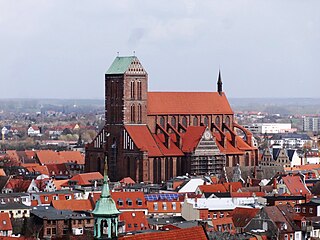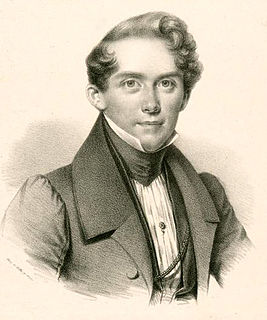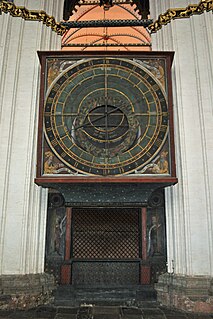Related Research Articles

Mecklenburg-Vorpommern, also known by its anglicized name Mecklenburg–Western Pomerania, is a state in the north-east of Germany. Of the country's sixteen states, Mecklenburg-Vorpommern ranks 14th in population, It covers 23,176 km2 (8,948 sq mi) making it the sixth largest German state in area, and 16th in population density. Schwerin is the state capital and Rostock is the largest city. Other major cities include Neubrandenburg, Stralsund, Greifswald, Wismar and Güstrow.

Wismar, officially the Hanseatic City of Wismar is, with around 43,000 inhabitants, the sixth-largest city of the northeastern German state of Mecklenburg-Vorpommern, and the fourth-largest city of Mecklenburg after Rostock, Schwerin and Neubrandenburg. The city was the third-largest port city in former East Germany after Rostock and Stralsund.

Friedrich Schlie was a German art historian and archaeologist.

The Abbey of the Holy Cross in Rostock, Germany, was founded in the 13th century by Cistercian nuns. It is the only fully preserved abbey in the city. The complex includes the former abbey church which is used today as the University Church (Universitätskirche). The remaining former convent buildings house the Museum of Cultural History for the city of Rostock.

Otto Piper (1841–1921) was a German architectural historian who, with August von Cohausen (1812–1896), is regarded as one of the two founders of scientific research into castles.

The Principality of Ratzeburg was a former state, existing from 1648 to 1918. It belonged to the imperially immediate territory of Duchy of Mecklenburg and was part of the Holy Roman Empire. Mecklenburg was split up in the third partition of Mecklenburg in the 1701 Treaty of Hamburg, which created the semi-ducal states of Mecklenburg-Schwerin and Mecklenburg-Strelitz, with the latter made up of the Principality of Ratzeburg and the Lordship of Stargard. Most of the Principality is now within the state of Mecklenburg-Vorpommern.
Paul Wallat was a German landscape artist, draftsman and sculptor.
The following is a timeline of the history of the city of Rostock, Germany.
Michael Buddrus is a German historian.

Otto Kade was a German musicologist, organist, conductor and composer.
Werner Ladwig was a German conductor.
Hans Gahlenbeck was a German conductor and Generalmusikdirektor (GMD).
Carl Adolf Martienssen was a German pianist and music educator.

Jacob Eduard Mantius was a German operatic tenor, composer and voice teacher.
Burkhard Meier was a German music educator and composer.

Nikolaus Lilienfeld was a German engineer and clockmaker of the late 14th and early 15th centuries.
The Kulturpreis der Hansestadt Rostock is a German cultural award endowed with 3,500 euros.

Johann Heinrich Suhrlandt was a court painter for Duke Frederick II, and Grand Duke Frederick Francis I, of Mecklenburg-Schwerin.

Carl Suhrlandt was a German painter. All of his works feature animals; mostly horses.

The astronomical clock of St. Nicholas Church, Stralsund is a 14th century monumental astrolabe clock. It was probably damaged in the 16th century, and has not worked since then. It is the only clock of its kind to have been preserved almost entirely in its original condition. The clockwork and the indications have not been restored.
References
- ↑ List of addresses at the University Rostock
- ↑ Manfred Schukowski on Leipziger Universitätsverlag
- ↑ Manfred Schukowski
- ↑ „Hightech des Mittelalters“: Astronomische Uhr der Rostocker Marienkirche erhält zum Jahreswechsel ein neues Ziffernblatt, retrieved 20 February 2021
- ↑ Professor bringt Buch zur Astronomischen Uhr heraus
- ↑ Ehrung für Prof. Dr. Manfred Schukowski